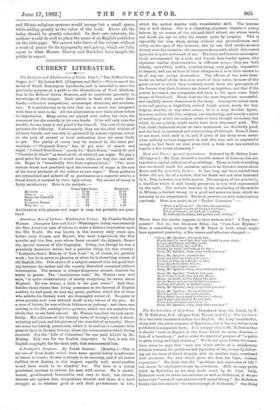A Prodigal's Progress. By Frank Barrett. (Bentley.)—This is not one
of those books which have some special hobby to advocate, or lesson to teach ; its aim is simply to be amusing, and if all novels fulfilled their destiny in this respect equally well, novel-readers would have much to be thankful for. The hero is a young gentleman anxious to- reform his past wild career. He is manly, honest, good-hearted, honourable, and easy to lead ; but circum- stances are against him, temptations abound, and there is a hard struggle as to whether good or evil shall predominate in him, which the author depicts with considerable skill. The heroine also is well drawn. She is a charming, piquaute, impulsive young heiress, by no means of the cut-and-dried school, one whose words
and deeds are apt to take the reader quite by surprise. This is especially the case when, acting without any premeditation and solely on the spur of the moment, she by one bold stroke secures victory over her enemies ; the unexpectedness with which this comes upon one is quite a triumph of art. The hero and heroine are respec- tively accompanied by a male and female bear-leader apiece, who represent similar characteristics in different sexes ; they are both elderly, untruthful, selfish, comfort-loving, very greedy, impossible to respect, and yet as fond of their charges as it is in their nature to be of any one except themselves. The efforts of the male bear- leader on behalf of the hero lose much of their value, because of the great extent in which they evidently result from the perceptiOn of the former that their fortunes are bound up together, and that if the patron be ruined, the companion will have to bit upon some fresh means of livelihood. These four are the most important, successful, and carefully drawn characters in the story. Among the minor ones, is its evil genius, a frightfully wicked Jesuit priest, ready for lies, forgery, murder, or any other crime ; ho is a very wooden figure, however, neither life-like, original, nor interesting, and merely a piece of machinery which the author seems to have thought necessary, but which, in our opinion, might easily have been dispensed with. The four chief characters whom we have mentioned are decidedly good, and the book is animated and entertaining all through. Even if there be not much solid stuff in it, and if parts of the story seem some- what unlikely to have happened in real life, who will be ungrateful enough to find fault on that score with a work that has served to beguile a few hours pleasantly ?


































 Previous page
Previous page